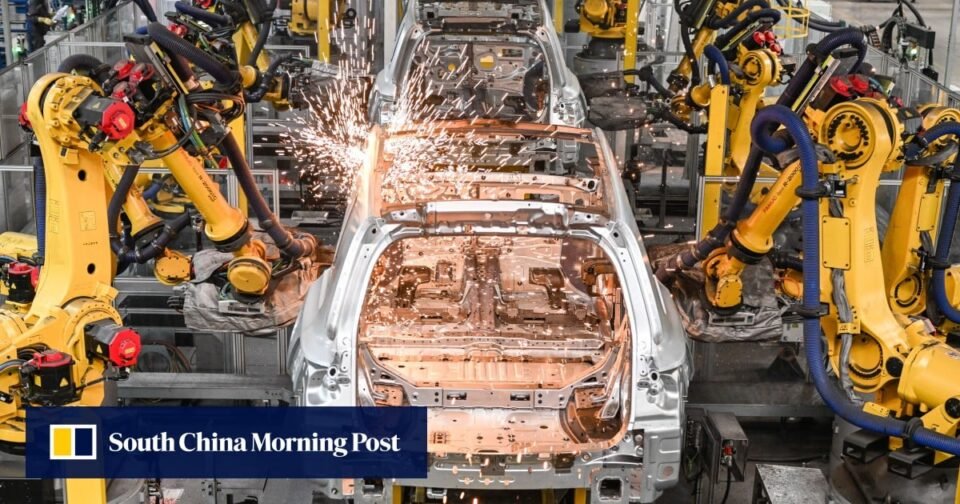Moreover, global private-equity funds are still “very positive” about mainland China, despite challenges ranging from geopolitical tensions with the West to regulatory uncertainties at home, with investors and businesses eyeing long-term opportunities in the energy transition, consumption, pharmaceuticals and technology sectors.
But while China is seeing strong growth momentum in several sectors, Mak said he did not expect to see “a significant bounce back” in terms of M&A activity, as the private equity industry – the main driver of deals – is still regaining momentum due to regulatory restrictions and a Covid-induced economic slowdown over the past two to three years.
“China is going through a major transition in terms of its economy, where it is [transitioning] from the manufacturing capital of the world into a very advanced economy,” Mak said.
“However, because of geopolitical tensions, China will need to do this transition by itself, rather than getting a helping hand from other advanced economies.”
Private-equity investors to return to China in search of M&A deals in 2024: Bain
Private-equity investors to return to China in search of M&A deals in 2024: Bain
He also pointed out that India, similar to China, is going through a major transition in its economic growth model, with the services industry rapidly emerging as a new driver of gross domestic product in place of manufacturing.
“Indian companies are also very attractive for western companies because of language, favourable policies for [foreign] companies to set up shop in the country … and for its highly skilled labour market,” Mak said.
In Japan’s case, low interest rates and a devalued yen are among key factors that make the country a “very attractive” M&A destination for domestic and international private equity funds, Mak said. Low stock valuations, an ageing population that has caused succession issues and strong shareholder activism are additional reasons that have drawn global investors to the market.
Chinese venture capitalist stays clear of mainland’s AI model investment frenzy
Chinese venture capitalist stays clear of mainland’s AI model investment frenzy
The recovery in Asia-Pacific deal activity is predicated upon the US Federal Reserve lowering interest rates in May and June, and continuing to do so in the following quarters, he added.
Against this backdrop, several sectors are emerging in China as “major” bright spots for inbound investments and cross-border M&A, including electric vehicles (EV) and the manufacturing of relevant downstream components.
“China is seeing deals in the [EV space],” Mak said. “Companies continue to invest in China, [but] probably a little bit differently than 20 years ago, where their investments [were spread] across many business sectors.
Sinopharm offers to take Hong Kong-listed China-TCM private in US$3 billion deal
Sinopharm offers to take Hong Kong-listed China-TCM private in US$3 billion deal
“Right now, it’s very specific, and multinational companies that are already in China will continue to invest in the market, whereas the less established companies that cannot compete with Chinese competitors at scale may exit.”
Technological innovation has been another key focus for China as the country pivots its economic growth model. However, due to tensions with the West and domestic policy, technology sectors such as artificial intelligence will see more participation from Chinese players, with ecosystems being built “specifically for the Chinese economy”, Mak said.
Another key trend Mak has observed is localisation. As regulation in China continues to be in focus, multinational companies are working with Chinese private-equity firms, state-owned companies and local governments to own shares in their businesses or get more involved in companies’ day-to-day operations.
Li Ka-shing’s CK Hutchison ends Italian telecoms joint venture with Sweden’s EQT
Li Ka-shing’s CK Hutchison ends Italian telecoms joint venture with Sweden’s EQT
“This is happening to companies at scale. So if you think about a company that’s currently listed in the US or London, they’re thinking about ‘do I need a separate IPO in Hong Kong for my China operations?’ [In the meantime,] these companies are inviting other Chinese shareholders to come in as well.”
While China is seeing strong growth momentum in several sectors, Mak said he did not expect to see “a significant bounce back” in terms of M&A activity, as the private equity industry – the main driver of deals – is still regaining momentum due to regulatory restrictions and a Covid-induced economic slowdown over the past two to three years.

